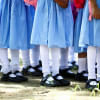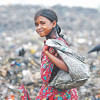The gritty girls

Shabana Akhter was a student of class eight when her father arranged her marriage with a complete stranger, but she could not let anyone mess with her childhood and education.
At first, she tried to stop it through talks with her parents, informing them of negative consequences of early marriage but in vain. Upset, yet determined to pursue her studies, she came up with a unique idea to foil the marriage.
"I shaved off my hair and appeared with my bald head when the suitor and his family came to see me. The marriage did not take place," said Shabana, of Gangachar in Rangpur, while sharing the story of her fight against her own early marriage before the audience at a programme at Krishibid Institution Bangladesh in the capital yesterday.
The audience lauded Shabana for her courageous move at the programme organised to mark the International Day of the Girl Child 2017, where five other girls were honoured with "Voice for Change Award” for beating the odds in their lives.
"I know if I continue my studies, I will become independent," said Shabana, now studying in class ten in Kholeya Khatri Khaal School and College in Gangachar.
Working with The Hunger Project, Bangladesh, the girl rushes to places in her locality to stop and prevent child marriages.
Brac, Acid Survivors Foundation (ASF) and the Australian High Commission organised the programme titled "The Power of the Adolescence Girls: Vision for 2030".
The five other girls honoured are Lilima Khatun, from Jessore; Amina Khatun Nila, from Khulna; Shamima Akhter, from Naogaon; Mukta Akhter Mou, from Dhaka, and Tuli Debnath, from Mymensingh.
Lilima, Amina and Shamima are acid survivors working with the ASF in their districts and in Dhaka. Mukta works for Brac and Tuli for Ghas Foring, a group of seven adolescent girls working against child marriages.
Tuli Debnath said she had been fighting against child marriages with the belief that a child should be born to a mother, not to another child.
"In our community, we have stopped 11 child marriages” and saved two children from child labour, she said.
Mukta Akhter Mou, a student of class ten in Tejgaon Adarsha School and College in Dhaka, said she had been raised by her maternal uncle since she did not have her mother and father.
Her uncle and his wife had wanted to marry her off when she was quite young, but she resisted the attempt with the help of her teacher and a local student watch group.
"I want to continue my education. Please pray for me," she said.
Speaking at the programme, popular singer Momtaz Begum, a member of the present parliament, said, a girl should fight for her own rights and be independent and ambitious.
Renowned psychologist Mehtab Khanam said a girl should learn to say no in a polite and firm way, whereas a boy should learn to accept no for an answer for any romantic relation. She stressed the importance of changing people's mindset and social attitude towards girls.
Sally-Anne Vincent, acting high commissioner of the Australian High Commission to Bangladesh, said South Asia has the highest rate of child marriage in the world, with 46 percent of the girls being married off by 18.
Very few countries have adopted strategies to prevent child marriages. "Child marriage forces a girl to leave her school, which is an obstacle in the development of the society," she said.
Anna Minz, director of gender justice and diversity programme of Brac, called for a movement against the culture of existing lawlessness in bringing sexual offenders to book.
Sheepa Hafiza, executive director of Ain o Salish Kendra, said clothe does not provoke rape, citing rape instances of 10-month-old girl child and 70-year-old woman.

 For all latest news, follow The Daily Star's Google News channel.
For all latest news, follow The Daily Star's Google News channel. 








Comments